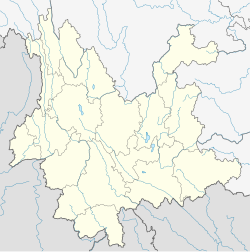Huyu Township
Huyu Township
户育乡 | |
|---|---|
 Entrance of the Government of Huyu Township | |
 Huyu Township in Ruili | |
 Huyu Township Location in Yunnan. | |
| Coordinates: 23°57′08″N 97°43′50″E / 23.95222°N 97.73056°ECoordinates: 23°57′08″N 97°43′50″E / 23.95222°N 97.73056°E | |
| Country | People's Republic of China |
| Province | Yunnan |
| Autonomous prefecture | Dehong Dai and Jingpo Autonomous Prefecture |
| County-level city | Ruili |
| Incorporated (township) | 1986 |
| Area | |
| • Total | 204 km2 (79 sq mi) |
| Population (2016) | |
| • Total | 8,521 |
| • Density | 42/km2 (110/sq mi) |
| Time zone | UTC+08:00 (China Standard) |
| Postal code | 678602 |
| Area code | 0692 |
Huyu Township (simplified Chinese: 户育乡; traditional Chinese: 戶育鄉; pinyin: Hùyù Xiāng; Jingpo: Hu yup or Hi yup) is a township in Ruili, Yunnan, China. As of the 2016 statistics it had a population of 8,521 and an area of 204-square-kilometre (79 sq mi).
Etymology[]
The name of "Huyu" means a place where wild musas grow in Dai language.
Administrative division[]
As of 2016, the township is divided into four villages:
- Huyu (户育村)
- Nongxian (弄贤村)
- Banling (班岭村)
- Leinong (雷弄村)
History[]
In 1956, the Government of Ruili County set up the Huyu Production and Culture Station to maintain control of the region. During the Cultural Revolution, it was renamed "Huyu People's Commune" and then "Dongfeng People's Commune" (东风公社). It was incorporated as a township in 1986.[1]
Geography[]
The township lies at the northwestern Ruili. To the northwest, the region is bounded by the Namwan River.
The highest point in the town/township is Yingpan Mountain (营盘山) which stands 1,765.5 metres (5,792 ft) above sea level.[2] The lowest point is Tuanjie Groove (团结大沟; 'Unity Groove'), which, at 769 metres (2,523 ft) above sea level.[2]
Economy[]
The local economy is primarily based upon agriculture. The main crops are rice, rubber, grapefruit, and dendrobium nobile.[3]
The Ruili Huanshan Industrial Park (second-phase project) sits in the township.
Demographics[]
| Year | Pop. | ±% |
|---|---|---|
| 2016 | 8,521 | — |
In 2016, the local population was 8,521, including 2,389 Han (28%) and 4,703 Jingpo (55.2%).[4]
Transportation[]
The Longling–Ruili Expressway Nongdao Extension Road passes across the township.
References[]
- ^ Chen Jiang 1996, pp. 81–83.
- ^ a b He Wenzhong & Yang Jincai 2012, p. 108.
- ^ He Wenzhong & Yang Jincai 2012, p. 103.
- ^ Yang Chunzheng & Yang Jincai 2017, p. 101.
Bibliography[]
- Chen Jiang, ed. (1996). 瑞丽市志 [Annals of Ruili] (in Chinese). Chengdu: Sichuan Lexicographical Press. ISBN 7-80543-518-9.
- Yang Chunzheng; Yang Jincai, eds. (2017). 瑞丽年鉴2017 [Ruili Yearbook 2017] (in Chinese). Mangshi: Dehong Nationalities Publishing House. ISBN 978-7-5558-0866-4.
- He Wenzhong; Yang Jincai, eds. (2012). 瑞丽市志 1978–2005 [Annals of Ruili, 1978–2005] (in Chinese). Kunming: Yunnan People's Publishing House. ISBN 978-7-222-10316-0.
- Divisions of Ruili
